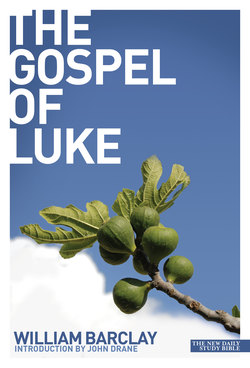Читать книгу Gospel of Luke - William Barclay - Страница 14
На сайте Литреса книга снята с продажи.
ОглавлениеLUKE
Luke 1:1–4
Since many have set their hands to the task of drawing up an account of the events which were completed among us, telling the story just as those who were the original eyewitnesses and who became the servants of the word handed it down to us, I too made up my mind to carry out a careful investigation of all things from the beginning, and to write to you, Theophilus, your excellency, an orderly account of them, so that you might have in your mind a full and reliable account of the things in which you have been instructed.
LUKE’S introduction is unique in the first three gospels because it is the only place where the author steps out upon the stage and uses the pronoun ‘I’. There are three things to note in this passage.
(1) It is the best bit of Greek in the New Testament. Luke uses here the very form of introduction which the great Greek historians all used. Herodotus begins, ‘These are the researches of Herodotus of Halicarnassus.’ A much later historian, Dionysius of Halicarnassus, tells us at the beginning of his history, ‘Before beginning to write I gathered information, partly from the lips of the most learned men with whom I came into contact, and partly from histories written by Romans of whom they spoke with praise.’ So Luke, as he began his story in the most sonorous Greek, followed the highest models he could find.
It is as if Luke said to himself, ‘I am writing the greatest story in the world and nothing but the best is good enough for it.’ Some of the ancient manuscripts are very beautiful productions, written in silver ink on purple vellum; and often the scribe, when he came to the name of God or of Jesus, wrote it in gold. The story is told of an old workman who, every Friday night, took the newest and shiniest coins out of his pay packet for Sunday’s offering in church. The historian, the scribe and the workman were all filled with the same idea – only the best is good enough for Jesus. They always gave their utmost for the highest.
(2) It is most significant that Luke was not satisfied with anyone else’s story of Christ. He must have his own. Real religion is never a secondhand thing. It is a personal discovery. Professor Arthur Gossip of Trinity College, Glasgow, used to say that the four gospels were important, but beyond them all came the gospel of personal experience. Luke had to rediscover Jesus Christ for himself.
(3) There is no passage of the Bible which sheds such a floodlight on the doctrine of the inspiration of Scripture. No one would deny that the gospel of Luke is an inspired document; and yet Luke begins by affirming that it is the product of the most careful historical research. God’s inspiration does not come to those who sit with folded hands and lazy minds and only wait, but to those who think and seek and search. True inspiration comes when the searching mind joins with the revealing Spirit of God. The word of God is given, but it is given to those who search for it. ‘Search and you will find’ (Matthew 7:7).
